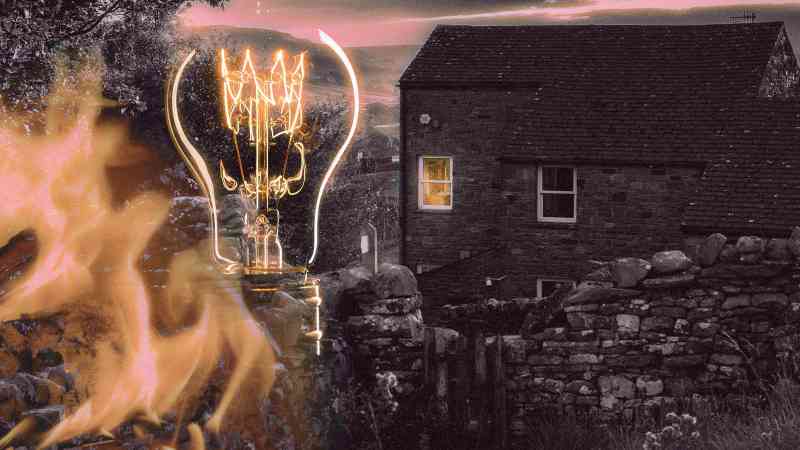If you have already capitulated and turned on your central heating, you are in the minority.
Most people will not switch on their heating for another two weeks, according to British Gas’s analysis of its seven million customers’ habits.
It expects the majority of people to relent and turn on the heating on October 24, or one day later that week. Typically, people wait until the minimum daily temperature is 9C for a few days.
The energy giant said Britons have their heating on for an average of four-and-a-half hours a day in autumn, and five hours and 15 minutes during the winter months at an average of 19 degrees. The peak times are 6am to 7am and 5pm to 6pm, according to the gas and electricity supplier.
Despite rising energy bills, British Gas said a “large group” had also switched on the heating during the first sign of colder weather in September.
Sunday Times readers may be less hardy than most. Of the 21,000 who voted in last Sunday’s readers’ poll, 43 per cent had already turned on their heating.
British Gas said customers could reduce their central heating bill this winter by bleeding their radiators so they worked more efficiently and by insulating their homes, including installing letterbox brushes, chimney balloons and keyhole coverings.
It recommended moving furniture away from radiators to prevent them absorbing the heat and suggested covering a thin sheet of card with tinfoil and placing it behind radiators to reflect back the heat.
Last week households were warned they could face three-hour electricity blackouts this winter if power plants did not have enough gas to keep running, impacting those with electric heating as well as people who use heat pumps, portable heaters and electric underfloor heating alongside gas central heating.
But the National Grid Electricity System Operator (ESO) said domestic blackouts are an “unlikely scenario”, and would occur only if no electricity were imported from Europe and there were insufficient gas supplies owing to Russia’s invasion of Ukraine.
ESO will pay suppliers to give financial incentives to customers to reduce their electricity consumption during peak times this winter. Households can volunteer to take part in the scheme and will be given a time slot when they would be asked to use less electricity in return for a payment.
People will be invited to sign up by their electricity suppliers in the coming weeks, pending Ofgem approval for the scheme. There are 12 trial days planned between November and March.
A source at ESO said it hoped customers would not be tempted to turn off their lights and electric heating in return for payment and would instead reduce their use of non-essential devices, such as computer games, televisions and dishwashers, during peak hours. “We definitely don’t want people sitting in the dark and feeling cold because they’re in a vulnerable economic position,” the source said.
Chimney sweeps say they are struggling to keep up with demand as households prepare to swap the central heating for log burners this autumn to save money.
With the average household’s yearly energy bills rising from £1,971 to £2,500 from October 1, families could save an average of £131 a year by turning down their thermostat and using a fire in the evenings, according to the energy consultants Gemserv. The saving is calculated on a family turning down their thermostat from 21C to 18C and having the fire on for three hours.
H Firkins & Sons has been cleaning flues in London since 1860, when Queen Victoria was on the throne and the year Charles Dickens published Great Expectations. This has been their busiest year in four decades, according to Josh Firkins, the great-great-great grandson of the founder.
Firkins, 34, said: “Almost all the houses we have been to over the last couple of weeks say they are going to use the fires more because of energy prices. I’ve had a couple of customers who we haven’t been out to for 10 to 15 years who want to start using them again this winter.
“Previously, people tended to have one fireplace which they would use once or twice a week. Now people are opening them up in different rooms, in studies and dining rooms. They tell us they plan to use them more frequently.”
In August the firm received two to three calls a day, but is now getting up to 30. It recently hired a new chimney sweep and an office worker to help to manage the workload and ordered an electric cargo bike to get around the capital faster.
The business said customers were younger than in previous years, with more professionals in their twenties and thirties installing fireplaces to cut their bills or to ensure they are not left without heating.
Italians will be barred by law from turning up their heating to more than 19C and those living in the warmer south will not be allowed to switch on their radiators until December. Those further north can do so earlier. It is not clear how seriously the new rules, announced last week, will be enforced.
France, meanwhile, is launching a major publicity campaign tomorrow, entitled Every Gesture Counts, with tips to cut energy and urging people to wear pullovers to keep warm. President Macron has led the way by appearing in a turtle neck sweater with several ministers following suit. “Not enough heating? Let them wear cashmere!” mocked Marine Le Pen, leader of the far-right National Rally.
@louise_eccles
